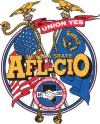Nevada AFL-CIO Stands in Solidarity with Home Care Workers

Carson City, Nev. — Today, the Nevada AFL-CIO stood in solidarity with Service Employees International Union Local 1107 in support of Senate Bill 340, the Nevada Home Care Workforce Safety & Standards Act, sponsored by State Senator Dina Neal (SD-4). The bill would give workers and clients a seat at the table by creating a Nevada Home Care Employment Standards Board made up of workers, consumers, employers, and state officials to protect both employees and those in their care. The bill will be heard in the Senate Finance Committee today.
The Executive Secretary-Treasurer of the Nevada AFL-CIO, Rusty McAllister, released the below statement in support of this crucial legislation:
“Across Nevada Home Care workers are underpaid, overworked and lacking the resources they need to succeed safely in their career paths. During the COVID-19 pandemic, these workers have worked ‘round the clock to provide care to their clients, even purchasing their own PPE to stay safe,” said McAllister. “With SB340, we can provide Nevada’s home care workers with an avenue to demand better pay, training, protection and working conditions. The Nevada AFL-CIO stands with these workers and SEIU Local 1107 in calling for passage for SB340.”
Among other protections, SB340 would empower home care workers to petition the Department of Health and Human Services to investigate our working conditions and allow that board to make recommendations around pressing issues such as ensuring living wages, benefits, and job training for workers to raise standards of care.
BACKGROUND FROM SEIU 1107:
Nevada has one of the fastest-growing senior populations in the nation. The need for high-quality home care services in the Silver State is skyrocketing, but too many of the state’s 13,000 homecare workers are underpaid and exploited— conditions that have only worsened during the COVID-19 pandemic. If Nevada doesn’t address this looming care crisis soon, thousands of more consumers will also be at risk.
Most of the funding for home care services in Nevada comes from taxpayer dollars flowing through the state’s Medicaid program. For too long, there has been too little transparency on how these public dollars are spent and not enough input from those on the frontlines doing the work and receiving the services. As a result, Personal Care Aides (PCAs) have been treated like second-class citizens instead of the essential healthcare workers they are.
